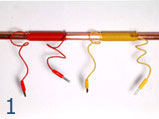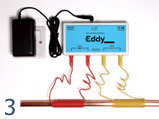


What Makes Water Hard?
Acid in rain
Most people have heard of acid rain produced by absorption of sulphur and nitrogen oxides by rainfall; however, the presence of pollutants like these gases is not the only source of acidity. Carbon dioxide constitutes 0.3% of the Earth’s atmosphere, and is readily absorbed by water to form carbonic acid – the acid found in carbonated beverages. Therefore, all rain is acidic to some extent, and has a strong tendency to dissolve minerals and rocks with which it comes into contact. Water is a good solvent and gathers impurities easily. Pure water, which is tasteless, colorless, and odourless, is often called the universal solvent. As rain falls it becomes slightly acidic as described above. As the water travels through soil and rock, it dissolves small amounts of minerals and holds them in solution. As already mentioned, Dissolved calcium and magnesium in water are the most common causes of hard water. The level of hardness increases as the magnesium and calcium increases.
Eddy – The Descaler
Why you need a descaler?
Scale, or limescale is a hard, whitish coating that builds up on surfaces that come into contact with hard water. Hard water causes limescale because it contains calcium carbonate (lime) and other minerals that stick to pipes and water heaters as water is heated. The accumulated limescale inside water heaters reduces their life and energy efficiency.
Water from a groundwater source is usually harder because minerals drain into it from the soil. Water from river sources is generally softer.
How Limescale Forms
When mains water is heated, it causes the dissolved salts to attach themselves to any metal they come into contact with, forming a creamy-coloured hard crust called limescale or scale. It’s a familiar sight on the heating elements in electric kettles and other boilers. In areas of the country where the water is naturally soft, the build-up takes a longer time to be noticed. In hard water areas, the limescale build-up can be relatively quicker.
The Descaler will minimise the Cause of lime scale formation
Unlike most substances, most calcium salts become less soluble as the temperature rises (commonly known as inverse solubility). Such salts are naturally present to some degree in all mains water supplies. Hence, any system where mains water is heated is liable to suffer from limescale formation. Consider a mains water containing 300 milligrams per litre (mg/l) of calcium carbonate hardness. The potential weight of limescale produced in a 100 litre central heating system is 30 grams, and this is from only the initial fill of water. Once formed, calcium scale tends to not redissolve, and water lost from the system for whatever reason will leave it behind.
The fresh make-up water will then bring more calcium salts into the system to begin the process again producing an ever-increasing thickness of scale. Being a direct result of increased temperature, limescale will form in the hottest part of the system, usually the heat transfer surface in the boiler. In contrast, iron oxide first forms as sludge at the point of corrosion, and only turns into limescale if it is carried by the water to the heat exchanger where it can become hardened by baking. You need a descaler.
